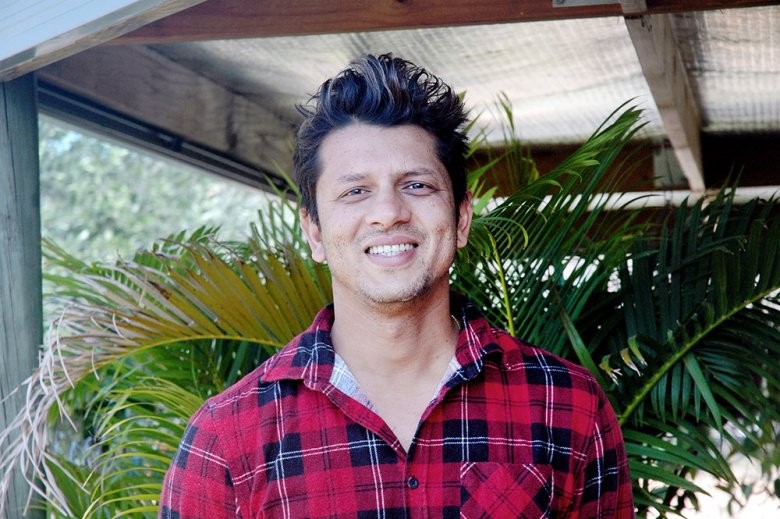Popular Reads
Top Results
Can't find what you're looking for?
View all search resultsPopular Reads
Top Results
Can't find what you're looking for?
View all search resultsChris Raja: Life after the elephant
To Australian author Christopher Raja, writing his first novel was a milestone but also a draining experience.
Change text size
Gift Premium Articles
to Anyone
B
ali may have its own assortment of unique characters, but the sight of a cowboy hat-wearing, middle-aged man of Indian appearance still managed to raise some eyebrows among locals.
The inevitable: Is he American? A Texas cowboy, perhaps?
To the inquiring taxi drivers’ surprise, author Christopher Raja did not hail from the United States. He had, however, been living in Australia’s Northern Territory, where cowboys and stockmen still roam the outback.
But despite the hat, Raja is an author, not a stockman, and he was in Bali last year for the 2016 Ubud Writers and Readers Festival (UWRF.)
“I got to go to Indonesia to represent Australia and at the same time promote my book: The Burning Elephant,” he recalled.
Read also: It began with an elephant
Raja described the trip as “incredible in so many ways”.
“Firstly, it was my first time in Indonesia — our closest and most important neighbor I think, which we know so little about and, I hate to say, which I know so little about too.”
Raja found Ubud to be a pleasant surprise — like many, he appreciated the locals’ welcoming attitude, the natural beauty of the landscape and the rich cultural practices.
He took part in a number of the festival’s workshops and panels, including “The Elements of Story” workshop and the “Imagining India” panel — the latter undoubtedly linked to The Burning Elephant.
Critics have praised the novel for various reasons: the pace, emotion, and the well-executed descriptiveness to name a few elements.
The Burning Elephant’s plot begins in the period shortly before the assassination of India’s prime minister Indira Gandhi — an event preceding an outbreak of communal violence and riots affecting thousands of people in the country.
The book’s protagonist is Govinda, a young boy who, like many others, learns about life’s heartaches as part of the bittersweet process of growing up.
His experiences, however, are intensified by numerous external circumstances including the country’s volatility and his family’s migration to Australia.
To Raja, writing his first novel was a milestone but also a draining experience — one that, according to him, left him completely empty in the end.
“It did take a lot out of me,” he said.
“Some people have asked me which character I most associate with — well, I associate with all those characters in that book and it was sort of a schizophrenic experience finishing the book because I couldn’t tell where the book finished and where my own life began.”
Like Govinda, Raja’s family migrated from India to Australia, but he avoids describing The Burning Elephant as autobiographical or even semi-autobiographical.
More than a decade ago, he made his own move from Melbourne to Alice Springs, a desert town in the dead center of Australia, to find out more about Aboriginal culture and peoples.
According to the Australian Bureau of Statistics, around 20 percent of Alice Springs’ population is indigenous — higher than most other regions in Australia, and the town is within close proximity of an important sacred Aboriginal site: Uluru, otherwise known as Ayers’ Rock.
Not only did Raja achieve his ambition of learning more about Aboriginal culture, he grew fond of the town and found it to be a source of inspiration.
Prior to The Burning Elephant, he authored and co-authored a number of literary works, including the play The First Garden, which tells of Olive Pink, a female anthropologist and Aboriginal rights activist who established the Olive Pink Botanic Gardens in Central Australia.
Raja is currently working on his second novel, at this point named The Tiger and the Serpent.
“At this point, [the title] might change,” he said.
While the novel and its plot are largely still in development, he knows one thing for sure: “I want to be good at this novel thing,”
“I acknowledge how much work it takes to write a book,” Raja said, labeling himself a rookie in the field of fiction writing while referring to fellow writers, such as British-Indian Amit Chaudhuri and South African-born Gillian Slovo as “serious” writers.
“When I encounter people that have written six or seven or 11 or 20 books, I pay respect to them, and I know that I too have to develop my skills and develop in terms of perseverance, persistence and it’s a journey.”
Humility aside, Raja’s first novel has earned him a number of successes, including being shortlisted for the Territory Read Awards in the Northern Territory, as well as invitations to literary events such as The Asia Pacific Writers and Translators Conference in Guangzhou, and, of course, the UWRF.
According to Raja, the latter enriched him in many ways, including new friendships and atmospheres, which felt different yet similar to other places he is fond of.
“I encountered a wonderful sense of hospitality among the people there,” he said of Bali.
“I have experienced it both in Central Australia among the tribal people but also in India where I was born.”
“And the spirituality of these places, Indonesia, Australia and India. They are all very old and special cultures.”
Raja found last year’s theme: “I am You, You are Me”, to be congenial to his philosophy as well.
“That made me think a lot about how we as a people are different but also the same in many ways,” he said, “And at this time when the world is having so much conflict, as writers, our job is to promote empathy.”











